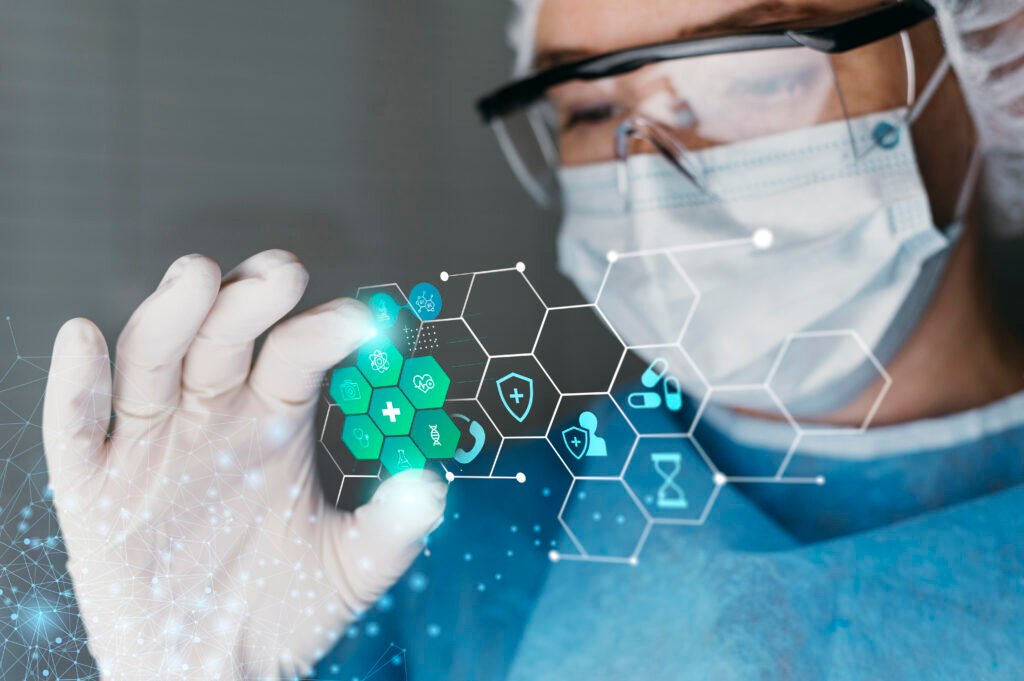
AI in Healthcare: Revolutionizing Patient Care and Diagnosis:
Artificial intelligence (AI) is a game-changer in the quickly changing healthcare industry, transforming patient diagnosis, treatment, and follow-up. Artificial intelligence (AI) is transforming the healthcare sector, offering more precise, effective, and easily accessible medical care in the future. Applications range from early disease identification to customized treatment programs. However, AI has a significant human impact that goes beyond data and algorithms; it is a tool that improves healthcare quality for patients.
A Glimpse into the Future: Artificial Intelligence Role in Early Diagnosis

Imagine not knowing what’s wrong and arriving at a doctor’s appointment with nebulous symptoms. In the past, this would result in a string of examinations and appointments, frequently accompanied by protracted wait times and a cloud of uncertainty. However, this situation is evolving because to AI. With unmatched accuracy, medical photos, test findings, and patient histories can now be analyzed by AI-powered diagnostic tools.
For instance, AI algorithms trained on thousands of images can detect anomalies that the human eye might miss, and often at a much earlier stage. This early detection is crucial to improving survival rates, as it allows for treatment to begin when the disease is most treatable. It’s not just about saving time; it’s about saving lives. An example of this would be the use of AI in the detection of breast cancer.
Personalized Treatment: The Power of Precision Medicine:
Every patient is unique, and so are their medical needs. AI is at the vanguard of a drive towards personalized medicine, where therapies are tailored to specific patients rather than a one-size-fits-all approach. By examining a patient’s genetic makeup, lifestyle, and even their response to past therapies, AI can help doctors build treatment programs that are individually suited to each patient.
This is a shift from reactive to proactive care, where AI empowers doctors to make better decisions that can significantly improve a patient’s quality of life. For example, in oncology, AI can analyze the genetic mutations in a tumor to recommend the most effective chemotherapy drugs, reducing the trial-and-error process that often accompanies cancer treatment. This not only improves outcomes but also minimizes the side effects and emotional toll on patients.
Bridging the Gap: AI in Remote and Rural Healthcare
Healthcare disparities are a global issue, with millions of people in remote or rural areas lacking access to basic medical services. AI is playing a pivotal role in bridging this gap by bringing healthcare to underserved populations. Telemedicine, powered by AI, is enabling doctors to consult with patients thousands of miles away, diagnosing and treating conditions without the need for in-person visits. AI-driven mobile applications and wearable devices are also making it possible for patients to monitor their health in real-time, alerting healthcare providers to potential issues before they become critical. For example, AI can analyze data from a wearable heart monitor to detect irregular heartbeats, allowing for early intervention in conditions like atrial fibrillation, which can lead to stroke if left untreated. This technology is democratizing healthcare, ensuring that more people, regardless of location, have access to the care they need.
The Human Touch: Enhancing, Not Replacing, Healthcare Providers
One of the biggest concerns about AI in healthcare is the fear that it might replace human doctors and nurses. However, the reality is quite the opposite. AI is not here to replace healthcare providers but to enhance their capabilities. It’s about augmenting the human touch, not eliminating it.
Doctors and nurses bring empathy, compassion, and critical thinking to patient care—qualities that AI, no matter how advanced, cannot replicate. AI can process vast amounts of data quickly, but it cannot hold a patient’s hand during a difficult diagnosis, offer comfort, or understand the nuances of human emotions. Instead, AI serves as a powerful tool that can relieve healthcare providers of time-consuming tasks, allowing them to focus more on direct patient care.
For instance, AI can automate the analysis of medical records and imaging, freeing up time for doctors to spend with their patients. It can also assist in decision-making by providing evidence-based recommendations, helping healthcare providers deliver the best possible care. In this sense, AI is a partner in healthcare, working alongside professionals to improve outcomes and enhance the patient experience.
Ethical Considerations: Navigating the Challenges of AI in Healthcare
As with any technological advancement, the integration of AI in healthcare comes with its own set of challenges, particularly around ethics and privacy. The use of AI requires access to vast amounts of patient data, raising concerns about data security and patient confidentiality. Ensuring that AI systems are transparent, unbiased, and used responsibly is critical to maintaining trust in the healthcare system.
Moreover, there is the question of accountability. When an AI system makes a recommendation or a diagnosis, who is responsible if something goes wrong? These are complex issues that require careful consideration and collaboration between technologists, healthcare providers, and policymakers. It’s important to strike a balance between innovation and regulation to ensure that AI is used in a way that benefits patients without compromising their rights.
The Emotional Impact: AI as a Catalyst for Hope
Beyond the technical and ethical aspects, it’s essential to recognize the emotional impact of AI in healthcare. For patients, AI represents hope—a hope that diseases can be detected earlier, treatments can be more effective, and healthcare can be more accessible. It’s a hope that their doctors have the best tools at their disposal to provide the care they need.
For healthcare providers, AI is a source of empowerment, enabling them to offer better care and make more informed decisions. It’s also a relief, as AI can take over some of the more monotonous tasks, allowing them to focus on what they do best—caring for their patients. In this way, AI is not just a technological advancement; it’s a catalyst for positive change in the healthcare system.
Conclusion: A New Era in Healthcare
The integration of AI in healthcare marks the beginning of a new era, where technology and humanity work hand in hand to improve patient care and outcomes. While challenges remain, the potential benefits of AI are undeniable. It’s a tool that can enhance the capabilities of healthcare providers, making care more accurate, personalized, and accessible. But at its core, AI in healthcare is about people—saving lives, improving quality of life, and bringing hope to those who need it most. As we continue to explore the possibilities of AI, it’s essential to keep the human experience at the forefront, ensuring that technology serves as a means to a healthier, more compassionate world.

